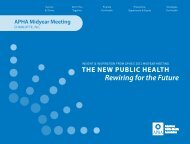EVIDENCE
missingevidence-digitalpdf-singlepages_2016
missingevidence-digitalpdf-singlepages_2016
You also want an ePaper? Increase the reach of your titles
YUMPU automatically turns print PDFs into web optimized ePapers that Google loves.
Awkward research does get published<br />
4.1 Contrary to the impression created by the behaviour in cases where publication has been delayed,<br />
many researchers and civil servants are familiar with strategies that can help government<br />
to commission and publish controversial research without fear of how the public or the media<br />
might respond. Some examples are described below. These include publishing more information<br />
about departmental research, appointing ad hoc committees to oversee research, commissioners<br />
and researchers working closely together to set questions and agree on publication timing and process,<br />
and allowing the reanalysis of sensitive data. These examples inform the recommendations<br />
at the end of this section to improve the visibility and utility of government research.<br />
Publishing more information about government research<br />
4.2 The Department for Environment, Food and Rural Affairs (Defra), Department for International<br />
Development, Department for Transport (DfT) and Department of Health have public databases<br />
where research is registered and progress to publication is tracked. There should be a single, publicly<br />
searchable database used by all departments that builds on the most useful features of these<br />
departmental systems (Recommendation I). This would enable people to obtain information about<br />
planned research as well as to locate and use the reports of completed work.<br />
4.3 Departments might also consider arrangements, such as those used by the Welsh government<br />
in its Emerging Findings Reports, to make early research findings or interim findings available,<br />
with the necessary caveats about peer review, in certain cases where there is a pressing need<br />
for research to contribute to current policy discussions.<br />
4.4 Publicly searchable research databases<br />
Defra’s Science Search website has a publicly searchable database of all research commissioned<br />
from third parties. This is based on what Defra staff, who are civil servants, enter into Omnicom,<br />
their internal database for managing all information related to research. Internal quality assurance<br />
and audit is undertaken by the Omnicom support team to ensure that Defra research managers<br />
and procurement staff are using the database and completing information appropriately. Omnicom<br />
is also used as a document repository to help the department track pre-project ideas, procurement<br />
documents such as contracts, meeting notes during the live stage of the project, and reports.<br />
4.5 Omnicom allows the department to review its whole research landscape. Intended publication date is,<br />
however, not a field in the system, although start and finish dates are — all deliverables are to be finalised<br />
by finish date, after which peer review and other quality assurance activities start.<br />
4.6 Mapping research on to government policy<br />
It was formerly the practice that government departments would publish a projection that showed what<br />
research was planned over the coming year, along the lines of the Home Office’s research programme.<br />
This practice appears to have largely ended following uncertainty over departmental research<br />
budgets in 2010. Publishing a forward look would enable other sectors and departments, the research<br />
community, parliament and the public to see planned research alongside the government’s policy<br />
priorities. The Welsh government’s Forthcoming Publications web page continues to fulfill this function.<br />
4.7 Although policy often moves faster than research, this does not mean that the public cannot<br />
scrutinise the extant evidence base. The Welsh government has developed Emerging Findings Reports,<br />
which they ask researchers and departments to prepare when an urgent policy announcement needs<br />
to be made before full research findings are available.<br />
31 SECTION 4: REMEDIES AND RECOMMENDATIONS



